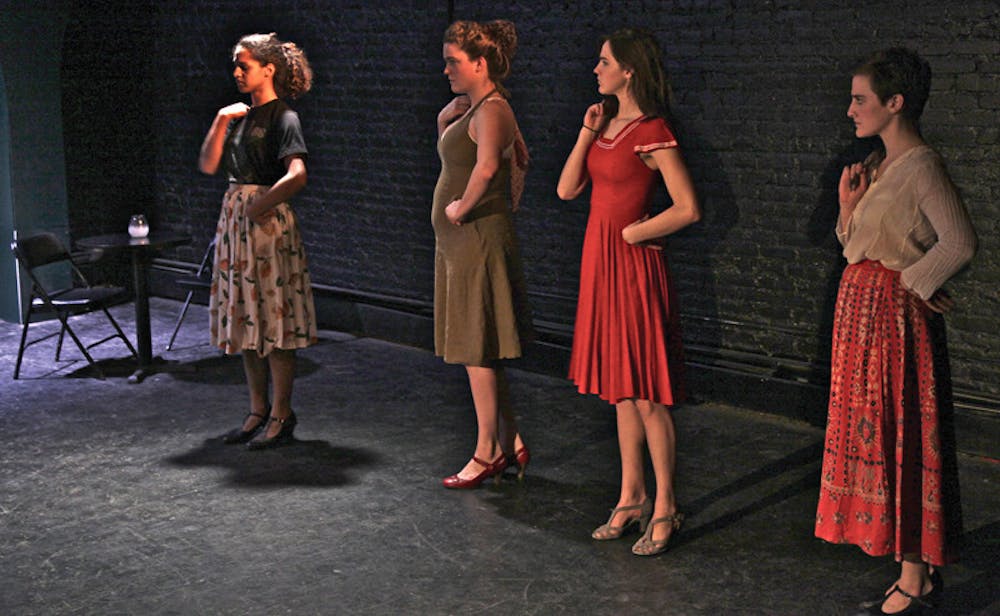If there is one thing director Ari Rodriguez ’13 wants you to know going into New Weird America, it’s that “vou” means “I will” in Portuguese.
And so he introduces his newest work, which opened Friday at AS220’s 95 Empire location. Set in a sparsely decorated black box theater, New Weird America is based around a traditional Chilean folk dance, the cueca.
During a recent visit to his parents’ home country of Chile, Rodriguez said he was struck by the “inherently theatrical” nature of this Chilean dance after witnessing a couple dancing alone in the center of a bar, while the other patrons watched.
“It was like we were seeing their relationship unfold,” he said. From this he became interested in the ways in which explicit staging and theatricality can replace realism in a work.
“The theater is already built in,” he said of the dance.
New Weird America is refreshingly, unabashedly weird. It lacks the pretense commonly associated with experimental theater. Rodriguez himself serves arriving spectators drinks, cookies and milk as swing music plays softly in the background.
The show opens with two simply dressed individuals cast in orange light. They slowly embrace, and the rest of the cast struts, crawls and dances onto the stage. In a rare false note in the work, the actors strip down to uniform white underwear, blindly form a circle and begin to dance. The movements were awkward and uncomfortable, and the segment’s link to the rest of the piece was unclear. When the actors finally open their eyes, they become aware of their near nudity and the presence of the audience, and rush to dress in South American-inspired folk costumes.
The actors pick up instruments lined up at the back of the stage — guitars, a tambourine, a ukulele and an accordion. Not all cast members had musical backgrounds before beginning the show, Rodriguez said. Anna Muselmann ’14 learned to play the ukulele expressly for this performance.
The love story of one couple, played by Muselmann and Nicholas Baird ’14, takes center stage, but each of the six other cast members pair off through a series of dances as the work develops.
The show is at its strongest and most dynamic when it incorporates live music. Some dances are performed to pre-recorded tracks while others are played and sung by the actors themselves.
In the seminal performance of the evening, Ursula Raasted ’14 lent her throaty and soulful voice to Spanish lyrics backed by a folk accompaniment. Muselmann and Baird perform a convincingly bold and flirtatious first dance to the tune of Raasted’s melodies.
The show ends with a breakdown — the actors revert to their initial shut-eyed blindness and Muselmann and Baird eventually find the stoic postures with which they opened the piece.
Rodriguez then solicited willing audience members to take the stage for a brief lesson in dancing the cueca.
The performance contains no English dialogue. Rodriguez said he hoped physical expression would be sufficient to evoke the sense of plot development, but added that he believed Spanish speakers would enjoy it as well.
Communication in the play is sparse, and words and props are few and far between. Grunts and indecipherable words accompany the minimalist blind movements with which it opens, and a later song consists entirely of the word “vou” — New Weird America relies heavily on bodily interactions to make its point.
“The show changes every night,” said Cheno Pinter ’14, the show’s production manager. “The more and more I watch it, the more I laugh and am moved by it.”
New Weird America has been in development for less than a month and is the first production by Rodriguez’s new theater collective, Folk Mantra. He said he is unsure about the future of Folk Mantra, but hopes to continue to create pieces centered on cultural traditions.
Staging the work at 95 Empire allowed greater access to the wider Providence community, Rodriguez said. The audience was more heterogeneous than might be encountered on campus.
But Pinter noted that one difficulty the group faced was the struggle to “legitimize (themselves) as more than just a group of hopeful undergrads.”
“We are Brown students but we’re also people and we think that what we’re doing matters,” Rodriguez said.

ADVERTISEMENT




